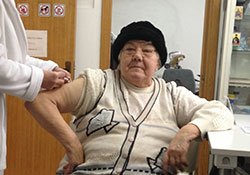Vaccination

WHO/Cassandra Butu
Influenza vaccines are safe, effective and the principal measure for preventing influenza and reducing the impact of epidemics.
Keeping up with the virus
Due to the influenza virus' continuous antigenic changes, WHO updates its recommendations for the composition of the vaccine annually in order to target the viruses expected to be the most frequently circulating in the coming season. In the northern hemisphere, the influenza season usually occurs during autumn and winter.
Protection for those most at risk
WHO recommends that health care workers and people who are most at risk of developing serious complications from influenza infection be vaccinated every year before the season begins. Priority groups for vaccination include:
- pregnant women
- individuals >6 months with certain chronic diseases
- elderly persons
- residents of institutions for older persons and the disabled
- children aged 6–59 months
- health care workers.
Increasing seasonal influenza vaccination uptake among these groups is a key strategy to reduce the burden of influenza in the European Region. WHO/Europe is therefore developing a guide, called "TIP FLU" (Tailoring immunization programmes for influenza), to assist national immunization programmes in designing targeted strategies to increase uptake among specific priority groups.
WHO/Europe also monitors seasonal influenza vaccination coverage and policies in the Region, in order to provide technical assistance to Member States that are expanding their seasonal influenza vaccination programmes.



